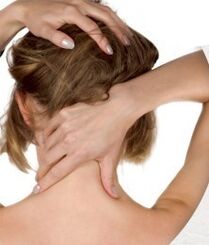Osteochondrosis is a degenerative dystrophic disease of the spine, which damages the intervertebral discs, nerve roots and soft tissues of the spine.
The clinical picture of osteochondrosis of the cervical spine is characterized by a variety of symptoms.This disease always becomes chronic.In osteochondrosis, cracks appear in the discs, pathological mobility (instability) of the vertebrae and the formation of intervertebral disc herniation.In this case, not only the nerve roots suffer more often, but also the vertebral arteries, which pass directly to the transverse processes of the cervical vertebrae.
Symptoms of cervical osteochondrosis
The most common complaint of osteochondrosis of the cervical spine is headache.Headache caused by pathological changes in the cervical spine may be accompanied by dizziness and pain in the cervical region and collar.
Causes of the development of cervical osteochondrosis
The causes of changes in the cervical spine are varied: prolonged stay in a position in front of the computer, static loads, sleeping in an uncomfortable position, hypothermia, injuries.As a result of this physical activity, the flow of blood through the vessels of the cervical spine is disrupted.Tension headache occurs.Headaches may occur sporadically or be chronic and worsen with physical activity, coughing, bending or tilting the head.Typically, the headache develops slowly, is of moderate or moderate intensity and is characterized by persistence and monotony.Sometimes it is migraine in nature, in severe cases it can be accompanied by nausea, vomiting, after which temporary relief occurs.
Tension headaches, as a rule, are unilateral in location and radiate to the temporal and ocular regions;There may be heaviness in the eyelid area, pain in the eyes and decreased vision.In more severe cases, dizziness, including loss of consciousness, occurs.The most severe form of tension headaches are transient ischemic attacks, up to the development of ischemic stroke.
Any headache requires careful observation and examination to exclude more serious brain pathologies.If you experience headaches, immediately contact a specialist - a neurologist.The Clinic's specialists have extensive experience in diagnosing and treating headaches of any origin.Timely and correct diagnosis and prescribing adequate treatment will save you from many problems and complications.
Where to start treating osteochondrosis?
If you suspect that you or your loved ones have cervical osteochondrosis, we recommend that you start by consulting a neurologist and examining the vessels of the cervical spine.

Read more about related diseases and symptoms:
- Panic attacks and depression in osteochondrosis
If a person does not have an innate predisposition to a depressive state, there have been no significant events in life that “disturb” him, in 90% of cases we are talking about problems with the physical state of vital systems - cardiovascular and circulatory.The cause of uncontrollable panic and unwillingness to enjoy life in the case of osteochondrosis is the degeneration of the vertebral cartilage in one way or another, which leads to disruption of the functioning of the surrounding nerve roots and blood vessels.
- Depression in osteochondrosis: Treatment.
The main reason for increased anxiety, apathy and depression in osteochondrosis is a lack of oxygen in the brain.With sedentary and stressful work, inactivity and lack of regular physical activity, deformation of bone tissue occurs in the neck area.
- About the causes of depression
Despite doctors' warnings that pain cannot be tolerated, not everyone heeds this advice.And regular pain, combined with stress, a sedentary lifestyle and bad habits, leads to a state of depression.This is the first stage of depression.
- Depression in osteochondrosis: causes and prerequisites
The experience of neurologists shows that diseases of a physiological and psychological nature are often interconnected.The body cannot constantly work “like clockwork”, especially if there is no regular “settlement”.Active lifestyle, physical exercise, proper nutrition, positive emotions - people deprive themselves of these pleasures in pursuit of material well-being.Result: cartilage degeneration, circulatory disorders and associated consequences: dizziness, inadequate reaction to psycho-emotional stimuli, increased anxiety, sometimes panic attacks.
- Spinal hernia.Everything you need to know.
The Clinic's leading specialists, based on their many years of experience, have collected for you all the necessary information on the prevention, treatment and prevention of intervertebral disc herniation.



















